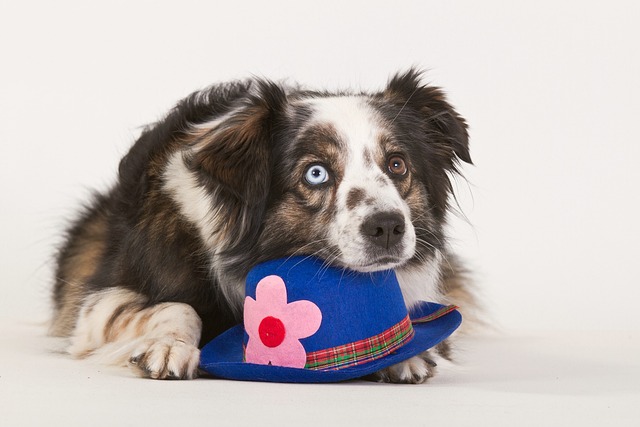In the warm moments spent with dogs, every breath and movement they make deeply touches our heartstrings. When the dog starts coughing all the time, the sound of 'cough cough cough' hits us like a heavy hammer, making us worry endlessly. As the closest guardian of dogs, our first reaction may be to worry if the dog has caught a cold. But is it really just a cold when a dog keeps coughing?
Coughing is a self-protection mechanism of the dog's body, just like an alarm. When the body detects secretions, foreign objects, or pathogen invasion or inflammatory stimulation in the respiratory tract, it will trigger this alarm. A cold is indeed one of the common causes of coughing in dogs. At the turn of seasons, the temperature fluctuates like a roller coaster, making it difficult for dogs' bodies to adapt and easily catching colds. When a dog catches a cold, in addition to coughing, there are often other obvious symptoms. They may sneeze frequently, one by one as if they are declaring war on the cold, but they also appear somewhat powerless. The nose can also become irritable, with clear mucus flowing out and the originally dry nose becoming damp. My eyes are no longer as bright and lively as usual, but slightly red with a hint of wetness, as if hiding grievances. Their mental state plummeted, and they, who were once lively and energetic, became lazy and disinterested in their favorite toys and games. They simply lay quietly in the corner, curled up into a ball, trying to get more warmth from themselves.
If a dog experiences these symptoms, it is highly likely that they have caught a cold. At this point, we need to give them more care and attentive attention. Create a warm and comfortable nest for your dog, lay a soft cushion on it, and let them rest well. Adequate rest is crucial for dogs to recover their energy and fight against diseases. Ensure that dogs can always drink clean and warm water. Moisture can help moisten their respiratory tract, relieve discomfort caused by coughing, promote metabolism, and accelerate body recovery. In terms of diet, appropriately add some nutritious and digestible foods, such as chicken breast Congee, nutritional cream, etc., to supplement energy for the dog's body and enhance its resistance. But if the symptoms of the dog persist and do not improve, or if there is fever, worsening cough, shortness of breath, etc., it is necessary to take the dog to see a veterinarian in a timely manner, as this may mean that the condition has worsened and requires professional treatment.
However, if a dog keeps coughing, it may not necessarily be caused by a cold, and there are many other reasons that can trigger this symptom. Canine infectious bronchitis, also known as "canine cough", is a common cause of cough in dogs. This disease has strong infectivity and is mainly transmitted through the air. It is easy to spread in places with a high concentration of dogs, such as pet hospitals, pet shops, kennels, etc. Dogs infected with canine cough often have a unique cough sound, which sounds like a severe dry cough and may also be accompanied by a goose like sound, sometimes even coughing up white phlegm. They may also experience symptoms such as sneezing and runny nose, similar to a cold, but the cough symptoms of canine cough are usually more severe and persistent. Once a dog is suspected of suffering from canine cough, it should be immediately isolated to avoid infecting other dogs. At the same time, the dog should be taken to the hospital as soon as possible. Doctors usually prescribe antibiotics and other medications based on the condition to control the infection and relieve symptoms.

Inhalation pneumonia is also one of the important causes of coughing in dogs. When a dog accidentally inhales foreign objects such as food particles, small toy parts, dust, or vomit refluxing into the lungs, it may cause aspiration pneumonia. These types of dogs usually cough frequently and with a deep cough sound, and may also be accompanied by symptoms such as difficulty breathing, fever, mental fatigue, and loss of appetite. If a dog suddenly coughs after suspected inhalation of a foreign object, it is necessary to take the dog to the hospital as soon as possible. The doctor will use X-ray, CT and other examination methods to determine the location of the foreign object, take corresponding measures to remove it, and give antibiotic treatment to prevent further deterioration of lung infection.
For elderly dogs, heart disease may also lead to coughing. As dogs age, their heart function gradually declines, and the heart cannot effectively pump blood throughout the body, which may lead to pulmonary congestion and coughing. This type of cough may worsen in dogs after exercise, excitement, or nighttime rest, and dogs may also experience symptoms such as shortness of breath, fatigue, reluctance to move, and abdominal swelling. If it is suspected that a dog's cough is related to heart disease, it is necessary to take the dog to the hospital for a comprehensive heart examination, such as electrocardiogram, echocardiogram, etc. The doctor will develop a personalized treatment plan based on the diagnosis results, which may include medication treatment, adjusting diet and lifestyle, etc., to reduce the burden on the heart and alleviate cough symptoms.
Tracheal collapse is also an issue that cannot be ignored in small dogs, especially some middle-aged and elderly small dogs. Tracheal collapse can cause a dog's trachea to become narrow, obstructing the flow of gas in and out, leading to persistent coughing. This type of cough is more pronounced in dogs when they are excited, exercising, drinking water, or exposed to external stimuli. The coughing sound may resemble a sharp "click" sound, as if something is stuck in the throat. If a dog experiences such coughing symptoms, it should seek medical attention promptly. Veterinarians may diagnose the condition through X-rays, bronchoscopy, and other examinations, and choose medication or surgical treatment based on the severity of the condition. In daily life, it is advisable to avoid vigorous exercise and excessive emotional excitement in dogs, and reduce stimulation of the trachea.
Environmental factors may also cause dogs to cough continuously. If dogs are exposed to smoke, dust, high pollen concentration, or chemical irritants for a long time, their respiratory tract will be stimulated, leading to coughing. For example, if someone smokes at home and a dog inhales secondhand smoke; The living environment is humid, which breeds a large number of dust mites; Spring pollen flies, dogs are allergic to pollen, and so on. Improving the living environment of dogs is key in this situation. Maintain indoor air circulation, regularly clean the room, and use an air purifier to filter impurities in the air; Avoid exposing dogs to allergens and minimize their outdoor activities during the pollen season; If someone smokes at home, try to avoid smoking in front of your dog or outdoors. If a dog's cough is caused by allergies, they can also be given some anti allergy medication under the guidance of a veterinarian.
When a dog keeps coughing, we need to carefully observe the dog's symptoms, combined with factors such as the dog's age, breed, and living environment, to preliminarily determine the possible cause. However, taking your dog to see a veterinarian in a timely manner is the safest approach. Veterinarians have professional knowledge and rich experience, and can accurately identify the root cause of a dog's cough through detailed consultations, physical examinations, necessary laboratory tests, and imaging examinations, and provide targeted treatment. In the process of treating and recovering dogs, we should give them enough patience and care to accompany them through this difficult time. Because every dog is an indispensable member of our family, they warm our lives with pure love and endless companionship. We should also be their strongest support when they need us, guarding their health.






